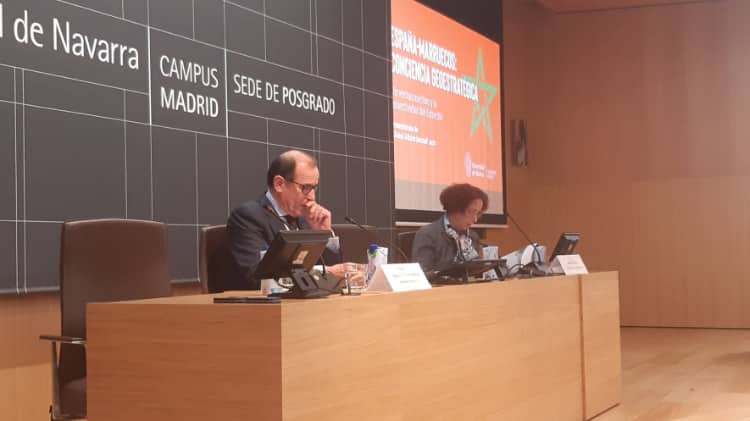The Diplomat
Ana Palacio, Minister of Foreign Affairs between 2002 and 2004, considers the turn taken by José Manuel Albares, the current head of this portfolio, towards greater Atlanticism in Spain’s international strategy, to be “good news”.
Palacio, who took part last Thursday in a panel on ‘geostrategic awareness’ organised in Madrid by the Global Affairs Centre of the University of Navarre, also pointed out that the collaboration offered to the United States by the government of Pedro Sánchez in the Ukrainian crisis, and piloted in the diplomatic field by Albares, ‘turns around’ the attitude of a certain distancing from Washington that the governing coalition had maintained.
For the former foreign minister, who was in charge of Foreign Affairs during the US response to the threats posed by Saddam Hussein’s credible rearmament, it is important for the international community to abide by the rules of law and transnational institutions and to respond in a coordinated manner with effective sanctions to any violations that Russia might currently be carrying out.
In Palacio’s view, it is precisely “the plummeting” of respect in the world for these internationally agreed frameworks since the Second World War that characterises the change in the world order that is taking place. “We are returning to a balance of power like the one that dominated Europe in the 19th century”, he said.
On the other hand, he advocated firmly defending Spanish interests in relations with Morocco, while at the same time respecting Morocco’s right to express its positions by appropriate means. “Spain must have a strategic vision, and we have generally had a compartmentalised vision. Spain needs a structured policy, not least because Morocco has one”, he declared.
After Palacio, at a round table to present the latest issue of “Global Affairs Journal”, dedicated to relations between Spain and Morocco, Carlos Echeverría, professor at the UNED and promoter of the Observatory on Ceuta and Melilla, expressed his conviction that the referendum on Western Sahara “will never be held”.
Echevarría indicated that the assertive attitude being seen in Morocco is partly due to the Moroccan perception of an “internal weakening” of Algeria and Spain, and rejected the idea that Madrid should correct its position and accept autonomy for the Sahara within Morocco. He considered that Madrid should not take “any step” in that direction, even if the referendum is not going to take place either.
Ignacio Fuente, a colonel at the Spanish Institute for Strategic Studies, who dealt with Spain’s relations with Algeria and Libya, warned that a conflict in Ukraine that hindered European access to Russian gas would generate greater competition for Algerian gas, which would pose a risk to Spain’s energy security, whose high imports of gas from that country would, in any case, increase in price.
Ignacio Urbasos, an expert in energy geopolitics, defended the possibilities of cooperation between Spain and Morocco in the production and transmission of green electricity.
Finally, Jesús Pérez Triana, who runs the blog FlancoSur, highlighted Rabat’s ability on its different diplomatic fronts, although he was sceptical about Morocco’s capacity for great projection in Africa, a continent that is being disputed by many powers.







